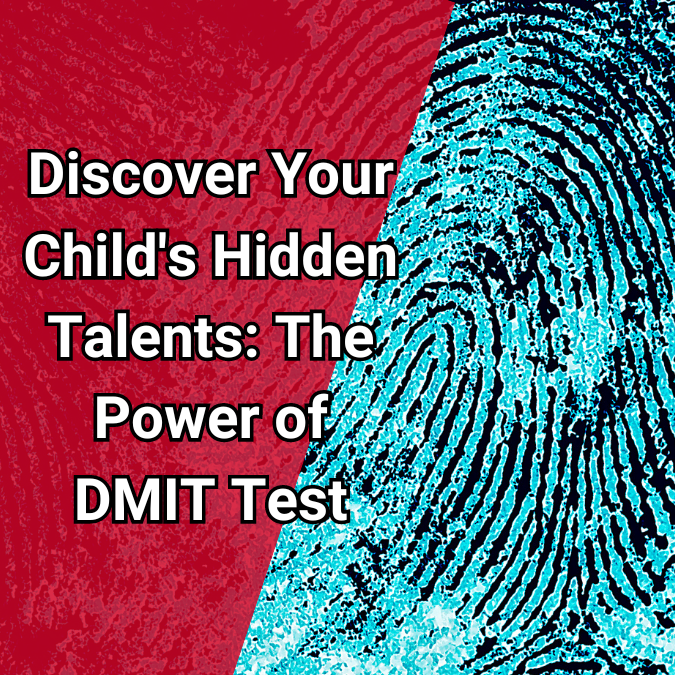How DMIT Test Benefits Kids Under 5-10 Years in 2024
As parents, we all share a common desire for the optimal development of our children. Our aspirations extend to their success in various aspects of life, including academics and extracurricular pursuits. Recognizing that each child possesses unique qualities, encompassing distinct strengths and weaknesses is essential. This is where the Dermatoglyphics Multiple Intelligence Test (DMIT) becomes significant.
DMIT is a scientific methodology designed to identify a child’s inherent talents and abilities by analyzing their fingerprints. This groundbreaking test serves as a valuable tool for parents seeking insights into their child’s learning style, personality, and potential career inclinations. In this blog, we will delve into the essence of DMIT, emphasizing its importance for children aged 5-10 years.
Our discussion will encompass a comprehensive understanding of how the DMIT test operates and the pivotal benefits it offers for the future development of your child. Additionally, we will scrutinize the advantages and disadvantages of opting for a DMIT test, empowering you to make an informed decision regarding your child’s future.
Understanding DMIT and Its Significance
The Dermatoglyphics Multiple Intelligence Test, commonly known as DMIT, explores fingerprint patterns to gain a comprehensive understanding of an individual’s abilities. Through scientific analysis of these patterns, the test unveils insights into learning styles, innate intelligence, communication preferences, and emotional quotient.
Utilizing NLP terms like ‘DMIT report,’ ‘IQ,’ and ‘EQ,’ the DMIT test contributes to a holistic view of a child’s potential, fostering positive development. This authoritative assessment not only facilitates the early recognition of talents but also provides valuable guidance for both personal and academic growth.
What is DMIT?
DMIT, or the Dermatoglyphics Multiple Intelligence Test, is a scientific examination of fingerprint patterns aimed at understanding a person’s potential capabilities, learning styles, and innate intelligence. By scrutinizing these patterns, DMIT offers a comprehensive understanding of capabilities, intelligence quotient, hidden talents, communication style, and potential in various career paths.
Why is DMIT crucial for children?
Comprehending a child’s innate talents, learning styles, and personality traits is pivotal for their overall development. The DMIT test analyzes fingerprint patterns, providing insights into a child’s potential, career guidance, emotional intelligence, and intelligence quotient analysis. This information can significantly benefit children aged 5-10 years in their educational journey.
How DMIT Counselling Works
The DMIT test, a scientific study of fingerprint patterns, employs a fingerprint scanner and sample collection technique to ensure the affordability, high accuracy, and clarity of fingerprint images. This process includes skin quality assessment, sample collection, and analysis by a fingerprint analyst, contributing to career guidance, emotional quotient evaluation, learning styles, intelligence quotient analysis, and communication style assessment.
Moreover, the DMIT report offers insights into potential career paths, emotional intelligence, and multiple intelligence factors like IQ and EQ, benefiting children aged 5-10 years in Indonesia and globally.
The Science Behind DMIT
The examination of fingerprint patterns in the DMIT test constitutes a thorough study that integrates embryology, neuroscience, brain lobes, and personality type analysis. It yields insights into multiple intelligences, communication styles, emotional quotient, and career guidance.
Furthermore, the test involves an analysis of the right brain, determining learning styles, and evaluating intelligence quotient and emotional intelligence. This scientific approach offers a holistic understanding of a child’s aptitude, providing guidance to parents and educators on effective ways to nurture their potential. Rooted in the study of fingerprints, DMIT embraces a wide array of factors contributing to a child’s overall development and future success.
The Process of DMIT Test
The DMIT test process involves a sophisticated sample collection technique and a fingerprint scanner for analysis. It engages in the scientific study of fingerprint patterns, evaluating communication style, emotional quotient, intelligence quotient, and career guidance.
Additionally, it analyzes right brain function, learning styles, and personality types at an affordable cost, ensuring accessibility. The process also takes into account the condition of skin quality during the sample collection technique. This inclusive approach ensures a comprehensive assessment of a child’s potential, optimizing their developmental journey.

Key Benefits of DMIT for Kids Under 5-10 Years
The DMIT test for children aged 5-10 years offers a comprehensive understanding of their potential, including innate intelligence, learning styles, emotional quotient, career guidance, and personality type. It aids in determining special needs, right brain analysis, communication style, intelligence quotient, adversity quotient, and career path analysis.
This holistic approach enables parents and educators to identify a child’s unique strengths and areas that require further support. Additionally, the DMIT report provides valuable insights into a child’s future, influencing their educational and career paths by focusing early on talent identification and enhancing parent-child communication.
DMIT Test Influence a Child’s Future?
Analyzing potential capabilities, learning styles, emotional quotient and career guidance in children aged five through thirteen years old, DMIT testing can have an immense impact on shaping their futures. It provides invaluable insights into personality type and intelligence quotient while simultaneously helping identify any hidden talents which lead them towards a prosperous path in life.
Multiple Intelligence
The DMIT report, developed from fingerprint patterns analysis, offers in-depth analyses of an individual’s IQ, EQ, CQ, AQ and multiple intelligences as well as their communication style, personality type and potential career path – providing a holistic view of their capabilities and giving individuals under 5-10 years a more informed career path that capitalizes on strengths while meeting any areas that might need extra support.
By uncovering such aspects early on through early DMIT tests like these early DMIT assessments can guide individuals – such as kids under 5-10 years on more informed career paths by capitalising on strengths while meeting any areas needing support while taking advantage of any weak areas or areas needing extra support while capitalizing on any areas needing additional support or providing further evaluation services or consulting on specific matters related to them or others’ capabilities and providing additional advice or services needed from various parties involved parties involved.
Determining Quotients
A DMIT test provides insight into an individual’s emotional quotient, adversity quotient, right brain analysis, personality type, communication style, intelligence quotient (IQ), learning styles, career guidance options and potential career path as well as innate intelligence to create a more complete picture of aptitudes and capabilities – providing parents and educators valuable guidance that allows them to support child’s development according to individual strengths as well as areas requiring development thus improving communication and relationship among them all parties involved.
Also Read this Article – Unlock Your Intelligence with Midbrain & DMIT Test in Patiala
Personality and Lifestyle
The Dermatoglyphics Multiple Intelligence Test identifies children’s innate abilities and potential. You get insight into their learning style and preferences, and even see if they have learning disabilities or challenges. Additionally, DMIT results can give parents tips on what extracurricular activities to take their kids to and help them grow.
In addition, the test pinpoints the child’s personality traits and lifestyle choices, giving them a better idea of their future career paths. Parents can make informed decisions about their child’s development when they know their child’s developmental path well.
Discover their Learning style
DMIT identifies a kid’s learning style, communication style, and clarity of fingerprint images by analyzing fingerprint patterns and dermatoglyphics. Based on a scientific study and multiple intelligence test analysis, we know a lot more about a child’s learning aptitude, brain lobes, special needs, and age group.
Besides letting you know a child’s learning style, personality type, communication style, and career options, the test also helps. Additionally, it helps provide insight for personalized guidance and support based on a child’s learning preferences, innate intelligence, learning aptitude, and inborn talent.
Early Talent Identification
In Early Talent Identification, fingerprint patterns, dermatoglyphics, and multiple intelligence tests are studied scientifically. With this test, you can find out a child’s learning style, special needs, age group suitability, and learning aptitude, and you get high accuracy and an affordable method of obtaining fingerprint samples.
Also, it lets you see how much potential a child really has, what hidden abilities he or she has, and how smart they are. It also tells parents and guardians how their kids communicate, their dermatoglyphics, and how they’ll fare in the workforce.
Improved Parent-Child Communication
DMIT improves communication between parents and kids. By understanding children’s learning styles, communication styles, and potential career paths, the test enhances communication clarity and quality. Insight into a child’s learning aptitude, career path, brain lobes, and age group is great.
Also, it shows you how fingerprint patterns work, dermatoglyphics work, multiple intelligence test analysis works, and how to get fingerprint samples. Parent-child communication improves when parents have this comprehensive understanding, which contributes to a child’s overall development by being supportive and understanding.
Pros & Cons of DMIT test for Kids under 5-10 years
DMIT tests provide a clear image of fingerprints, high accuracy, and a more diverse picture of aptitude. They let you know your kid’s learning style, communication style, and potential career options. Additionally, it helps determine if a child is a good fit for an age group, brain lobe, and special needs.
Also, the DMIT test identifies early talent, boosts self-esteem, and improves parent-child communication. As well as fingerprint analysis, dermatoglyphics, multi-intelligence testing, and communication clarity, the test offers a scientific study of a child’s potential and development.
Enhancing Self-Esteem
By revealing a child’s hidden talents, innate intelligence, and potential, the DMIT test helps in identifying learning and communication styles, personality types, and career options. Identifying talent early enhances a child’s self-esteem, which leads to greater confidence.
The test also offers high accuracy, clarity of fingerprint images, and a study of fingerprint patterns, dermatoglyphics, and multiple intelligence tests. This test boosts a child’s confidence and self-worth by giving him/her insight into potential career paths, which leads to better communication between parent and child.
Potential Career Guidance
By taking the DMIT test, you’ll get an in-depth understanding of a child’s abilities, communication style, and career path. It goes beyond traditional IQ tests, encompassing emotional quotient (EQ), adversity quotient (AQ), and intelligence quotient (IQ). Using fingerprint patterns and dermatoglyphics, the test provides precise age group matchups and career guidance.
The DMIT report also helps identify early talent and boosts parent-child communication. It’s easy to use, affordable, and highly accurate.
Conclusion
As a whole, the DMIT test is pretty awesome for kids under 5-10. As well as identifying multiple intelligences, it can also help determine their quotients, understand their personality and lifestyle, discover their learning style, and identify early talent. While the DMIT test can be a valuable tool, it also has its pros and cons. It enhances self-esteem and also provides potential career guidance. You have to think about all aspects before making a decision. If you want to know more about the DMIT test and how it can help your child, feel free to ask us for help.
Check out this Blog on Renatus Wellness
Frequently Asked Questions
What is the DMIT test for children?
An innate ability and learning style are determined by the DMIT test, which is also called the Dermatoglyphics Multiple Intelligence Test. The test helps parents understand their child’s strengths and weaknesses, so they can guide their child’s education better. It’s important to have it done by a professional.
What are the benefits of the DMIT test?
DMIT test offers valuable insights into a child’s strengths, learning style, personality traits, and potential career paths. This helps parents tailor education to meet their child’s individual needs and can assist in early intervention for developmental or behavioral issues.
What is the biometric test for children?
The biometric test for children, known as DMIT (Dermatoglyphics Multiple Intelligence Test), examines a child’s fingerprints and palm prints. It provides insights into their innate abilities, learning styles, and potential career paths. Results can be used to create a personalized development plan.
What are dermatoglyphics for kids?
Dermatoglyphics for kids involves the scientific study of fingerprints, palm prints, and footprints. It provides insights into a child’s innate abilities, learning styles, potential challenges, personality traits, and behavior patterns. This information can guide parents and educators in supporting the child’s development.
What is the age limit for the DMIT test?
The age limit for the DMIT test is flexible, allowing kids under 5-10 years old to take the test. However, it’s important to consider that the accuracy of results may vary based on their age and development. Choosing a reputable organization to administer the test is crucial for reliable insights into a child’s learning style and strengths.
What is the success rate of the DMIT test?
The success rate of the DMIT test can vary based on individual factors. It is important to note that the test does not guarantee success or failure in life. The accuracy of the test depends on the expertise of the practitioner conducting it. Ultimately, the results should be used as a tool for self-awareness and personal growth rather than as a definitive answer.
What is a fingerprint test for the brain?
The fingerprint test for the brain, also known as the Dermatoglyphics Multiple Intelligence Test (DMIT), is a scientific method that analyzes fingerprints to identify a child’s strengths, weaknesses, and potential. It helps parents understand their child’s learning style, temperament, and personality traits, enabling appropriate education and career guidance.
How much does the Dermatoglyphics multiple intelligence test cost in India?
The cost of a DMIT test in India can vary depending on the provider and level of analysis. Prices range from INR 5,000 to INR 10,000 or more for comprehensive ones. It’s important to compare providers and consider additional consultation costs.




